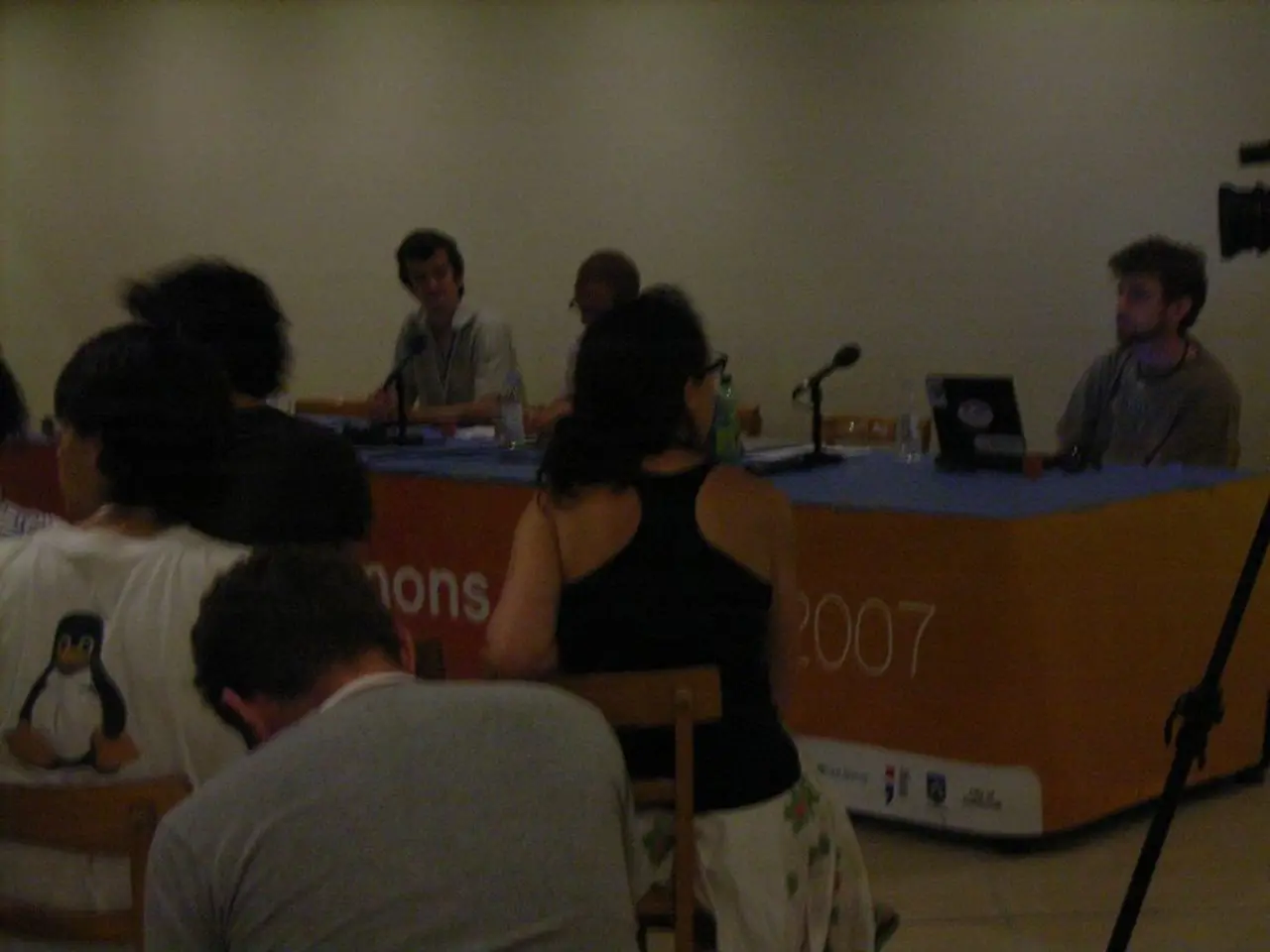Engaging Pursuits for Elderly Blind Individuals Living with Dementia
In an effort to improve the quality of life for blind seniors with dementia, a variety of activities have been found to offer cognitive, emotional, and entertainment benefits. These activities are designed to cater to the sensory limitations of this population, while also supporting cognitive function, emotional well-being, and providing enjoyment tailored to their unique challenges.
Music Therapy
Playing familiar songs, using musical instruments, or singing along can stimulate memory and improve mood, offering comfort and joy. This form of therapy is a powerful medium for self-expression for seniors with dementia, fostering a sense of joy and connection with the rhythm of life [1].
Tactile Games and Crafts
Engaging in activities like working with soft clay, textured materials, or large-piece puzzles designed for touch can help maintain fine motor skills and cognitive function without relying on vision [1].
Storytelling and Audiobooks
Listening to audiobooks or family members telling stories fosters emotional connection and cognitive engagement through auditory stimulation. This is a great way for seniors to maintain a sense of connection with their loved ones and the world around them [1].
Scent-Based Activities
Using essential oils, scented herbs, or baking to involve the sense of smell provides grounding and soothing sensory stimulation. This can be a calming and therapeutic activity for seniors [1].
Sensory Walks
Even indoor guided walks involving safe textures, sounds, and smells support mobility and sensory engagement in a gentle way [1].
Simple Crafts and Adapted Games
Activities such as knitting or tactile art projects help maintain fine motor skills and creativity in a non-visual way. E.g., adapted puzzles or sorting activities provide cognitive stimulation suited to dementia [4].
When planning activities for this population, it's important to keep tasks simple, repeatable, and use familiar voices or routines to create safety and emotional comfort [1].
Dancing, Tandem Cycling, and Podcasts
Dancing is not only a fun way to exercise but also a powerful medium for self-expression for seniors with dementia. Dance sessions can be arranged where seniors can hold hands with partners or caregivers for safety and enjoyment [2]. Tandem cycling allows seniors to feel the wind in their hair, stay active, connect with nature, and enjoy the companionship of a shared adventure [5]. Podcasts offer contemporary auditory pleasure with a wide range of genres, stimulating mental faculties and fostering a sense of connection [6].
Accessing Resources
A talking book reader can be obtained through local Associations for the Blind and the Braille and Audio Reading Download (BARD) system, providing access to a world of free books and magazines [3]. Old-time radio shows offer a sense of nostalgia and are easily accessible through local libraries or online platforms [7].
By combining these activities, we can enhance quality of life by combining stimulation across senses, promoting social connection, and providing enjoyment tailored to blindness and dementia challenges. Joining a support group for the visually impaired allows seniors to engage in meaningful conversations, share stories, and build a sense of community [8]. Support group gatherings for the visually impaired are often held in outdoor settings, offering a breath of fresh air and a chance to connect with others facing similar challenges [9].
[1] Alzheimer's Society, (2020). Activities for people with dementia. [Online] Available at: https://www.alzheimers.org.uk/about-dementia/activities-for-people-with-dementia
[2] Moula, J. (2019). Dancing with dementia. [Online] Available at: https://www.alzheimers.org.uk/about-dementia/dementia-and-you/living-with-dementia/activities-and-entertainment/dancing-with-dementia
[3] Royal National Institute of Blind People (RNIB), (2020). Talking books and magazines. [Online] Available at: https://www.rnib.org.uk/products-and-services/audio-books-and-talking-books/talking-books-and-magazines
[4] Alzheimer's Society, (2020). Activities for people with dementia. [Online] Available at: https://www.alzheimers.org.uk/about-dementia/activities-for-people-with-dementia
[5] Moula, J. (2019). Tandem cycling with dementia. [Online] Available at: https://www.alzheimers.org.uk/about-dementia/dementia-and-you/living-with-dementia/activities-and-entertainment/tandem-cycling-with-dementia
[6] Alzheimer's Society, (2020). Activities for people with dementia. [Online] Available at: https://www.alzheimers.org.uk/about-dementia/activities-for-people-with-dementia
[7] Moula, J. (2019). Old-time radio shows. [Online] Available at: https://www.alzheimers.org.uk/about-dementia/dementia-and-you/living-with-dementia/activities-and-entertainment/old-time-radio-shows
[8] Alzheimer's Society, (2020). Support groups. [Online] Available at: https://www.alzheimers.org.uk/get-support/support-groups
[9] Alzheimer's Society, (2020). Support groups. [Online] Available at: https://www.alzheimers.org.uk/get-support/support-groups
- Science in ‘workplace-wellness’ programs is increasingly recognizing the importance of mental-health activities like music therapy, sensory walks, and tactile games as crucial components for cognitive stimulation and emotional well-being among workers.
- Aging populations benefit greatly from health-and-wellness programs, many of which incorporate fitness-and-exercise regimens tailored to seniors' unique needs, as well as therapies-and-treatments for conditions such as dementia.
- Supporting mens-health involves not only physical fitness but also mental-health considerations, with activities like yoga, mindfulness meditation, and journaling promoting personal-growth and overall well-being.
- Skin-care routines can be an integral part of self-care for individuals, helping maintain youthful appearance and confidence, while also providing stress-relief and relaxation through the application of skincare products.
- Meeting the diverse needs of the aging population requires an approach that takes into account various aspects of their lifestyle, including education-and-self-development opportunities, via workshops, online courses, or book clubs, and engagement in relationships, such as social support groups or pet-therapy sessions.
- Womens-health care often encompasses preventive screenings, mental-health support, and reproductive-health services, as well as wellness practices likeones that involve caring for the skin and body through fashion-and-beauty rituals and healthy food-and-drink choices.
- In the realm of home-and-garden, many activities can provide mental stimulation and therapeutic benefits, such as gardening, knitting, or engaging in hobbies that foster creativity and relaxation.
- Traveling offers not only excitement and adventure but also opportunities for social interaction, learning about different cultures, and emotional growth through personal experiences.
- In the digital age, many educational resources are available online, making it possible for active learning and self-development to be integrated into daily routines, whether through reading, streaming courses, or participating in webinars.
- The rise of e-commerce has made it easier for consumers to engage in shopping experiences that cater to various sensibilities, from high-end fashion-and-beauty to affordable home-and-garden essentials, thus contributing to a sense of fulfillment and personal-growth.
- Career-development frequently focuses on practical skills training or job-search assistance but neglects the importance of maintaining mental health and work-life balance, with activities like taking breaks, meditating, or switching tasks to promote focus and productivity.




